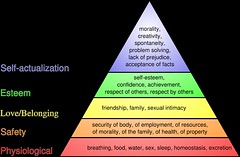Cross-posted at God Is For Suckers
Let's talk about actualization, you and I. Take a good, strong look at where we stand.
Abraham Maslow, in 1943, a leader in humanistic psychology, came up with the theory of self-actualization.
No, this is no New Age nonsense: it's not some Deepak Chopra chaff. It's a theory that makes a lotta sense.
Maslow's Hierarchy Of Needs is as follows:
a theory in psychology that Abraham Maslow proposed in his 1943 paper A Theory of Human Motivation, which he subsequently extended to include his observations of man's innate curiosity. His theory contended that as humans meet 'basic needs', they seek to satisfy successively 'higher needs' that occupy a set hierarchy. Maslow studied exemplary people such as Albert Einstein, Jane Addams, Eleanor Roosevelt, and Frederick Douglass rather than mentally ill or neurotic people, writing that "the study of crippled, stunted, immature, and unhealthy specimens can yield only a cripple psychology and a cripple philosophy."[1] Maslow also studied one percent of the healthiest college student population. While Maslow's theory was regarded as an improvement over previous theories of personality and motivation, it had its detractors. For example, in their extensive review of research that is dependent on Maslow's theory, Wabha and Bridwell (1976) found little evidence for the ranking of needs that Maslow described, or even for the existence of a definite hierarchy at all.
I disagree with this last sentence. We require our physical needs be met. We yearn for security, routine. As pack animals, we absolutely must be loved, and provided with a sense of belonging. From those three, flows the fourth. We are, after all, hierarchal creatures.
My addendum to this, is that the religious folks are pretty much stuck at the Esteem level.
Let's elaborate, with a personal anecdote. I had a pretty tough childhood (yeah, I know, we all did, just bear with me). Insecure, bullied, wrestling with the divergent hormone avalanche, I sought out alternative ways of validation. Food was one. The occult was another.
It gave me a secret, it gave me the illusion of power. Adolescent fantasies of strength. Luckily, I outgrew all that folderol.
And here is my take: there are many, many things in this life, this world, this universe, that are out of our individual control. Weather, other people's behavior, other variables over which we exert zero control.
So it is in this cloak of flesh we wear, that insecurity plagues us, dogs our footsteps, and sends the wearer on various bunny trails.
So, of all the paths we tread, those that are most tempting, are the ones that are well trodden, that whisper of the ego of personal power. Whether it be of ourselves as the mighty warrior or the keeper of darkness, the vessel of some ghostly power that will act upon us or to impart some supernatural element in hopes that all will be made right one day, that keening wail of the down-trodden that someone comes someday to pass judgment so that the scales will be righted.
If we look at the fifth level, the formula comes clear: most atheists I know are in possession of those attributes (that I know of: there are exceptions, no doubt).
Atheism is what adults do, that is, when the bloom is off the adolescent rose.
And so we as atheists go about, attempting to educate fellow our adults, who are trying to clutch the dreams of their youth with tremulous hands. It falls to us, then, to lead the world to maturity.
This is the Apostate, signing off.















3 comments:
Interesting idea. Much of what Maslow wrote about self-actualized individuals does remind me of many of the more open atheists I've met.
Good post KA. I had heard of this behavioral hierchery before but thought Freud was responsible for the theory. Did a quick little search on the subject and found that there are quite a few motivational theories out. One little tidbit I thought interesting: "Early explanations of motivation focused on instincts. Psychologists writing in the late 19th and early twentieth centuries suggested that human beings were basically programmed to behave in certain ways, depending upon the behavioral cues to which they were exposed. Sigmund Freud, for example, argued that the most powerful determinants of individual behavior were those of which the individual was not consciously aware."
vjack - I was kicking around an idea for looking at how self-esteem is impacted by religious thought (or vice versa), when I looked up self-actualization.
Everything fell into place after that. It seemed to fit quite nicely.
PLV - while Freud's been pretty much relegated to the dustbins of history in most of his approaches, he began a systemic analysis of the human psyche that has had deep impacts on the way we see it today.
Once we eliminate the supernatural, addressing the imbalances of mental imbalances becomes blaringly obvious.
Occam's razor - a lovely, lovely way to trim the driftwood.
Post a Comment